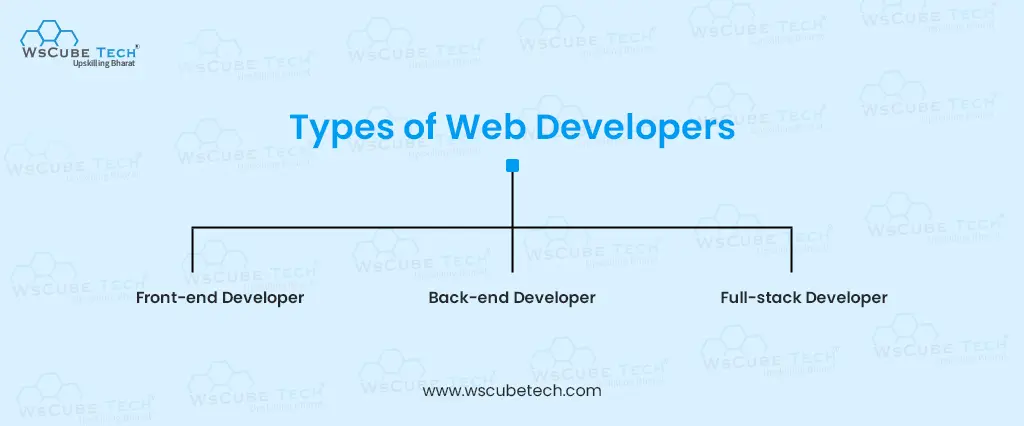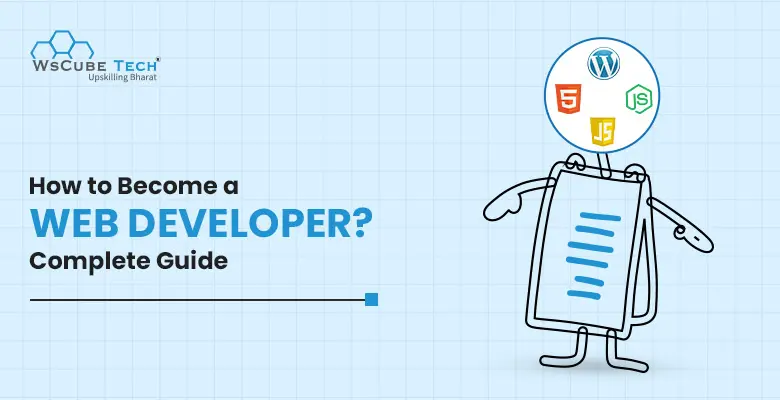Do you ever wonder who makes every website, web application, or software that you use via the internet? It’s web developers. Web development is an exciting career path and an in-demand technical skill today. The ever-rising popularity of the internet and the increasing number of internet users contribute to a surge in the demand for web developers.
Almost every online business and organization has a website, working as the face of their brand for the world. It’s web developers who are responsible for building and maintaining websites. No wonder that web development offers ample opportunities for tech enthusiasts and a secure career.
Being a lucrative and promising career path, ‘How can I become a web developer?’ is a common question in the field among aspirants. If you also want to be a web developer in the future, you have come to the right place to learn about this thriving industry.

In this blog, we will shed some light on this fascinating sector and learn how to become a web programmer. We will discuss different web development expertise and go through the step-by-step guide to becoming a web developer.
Who is a Web Developer?
Web developers are professionals who design, maintain, and optimize websites and web applications that can be accessed via the internet by users. They compile a set of code to create appealing, feature-rich, and functional websites. They can work on the front end, back end, or both aspects to create a dynamic website or web application.
Web developers rely on insights from software development, computer programming, and graphic design and work with other professionals in the field to deliver a project within the stipulated time and budget.
They are well-versed in different programming languages to create and maintain websites. They are no less than the backbone of any online business as they ensure that visitors get the best experience when they use the website or web application. Their job roles, duties, and responsibilities may vary depending on the company, position, and team size.
As you prepare to become a web developer, it is crucial to understand how to start web development and learn the intricacies of web development to get a closer look at the profession and make an informed career choice.
Upskill Yourself With Live Training
| Recommended Courses for You | Book Live Class for FREE! |
| Full Stack Web Development Course | Book Now |
| WordPress Course | Book Now |
| Front-End Development Course | Book Now |
What Does a Web Developer Do?
Web developers are responsible for creating and maintaining websites and web applications, writing code to design the appearance and functionality for a seamless user experience. They work with web-based application servers, computers, desktops, and other programming devices to build visually appealing websites.
Any social media platform, e-commerce website, music or video streaming website, or online application that you use via the internet is designed by a team of web developers.
They use different tools and programming languages, such as PHP, HTML, CSS, Python, JavaScript, and more, to build projects and deliver dynamic digital products to clients. They collaborate with designers, product managers, researchers, testers, and stakeholders to understand the goals of a project and accordingly design the end product to meet the client’s requirements.
Designers take care of the look and feel of a website, whereas developers focus on turning these designs into a fully functional product.
In addition to developing and designing, web developers also handle website maintenance and updates. They catch and fix bugs that can hamper the features and functionality of a website and introduce the latest updates to ensure enhanced speed, security, and usability of a web application.
They also evaluate code for redundancies, accuracy, and structural integrity while optimizing different components for better scalability and outside integration.
Also read: What is Full Stack Development? 2025 Guide
Types of Web Developers

Before you get familiar with how to be website developer, take a look at different types of developers. Broadly, there are three primary types of web developers based on their area of expertise and specialization.
1. Front-End Developers
Front-end developers work on the visual part of a website, which means the part that users can view or interact with. When you imagine a website, you probably assume its front end, which includes colors, images, theme, font, and other visual elements that give a website its final look.
Developers use three programming languages- HTML, CSS, and JavaScript- to design the layout of a web page and integrate graphics for better website performance.
Front-end developers are mainly responsible for ensuring that a website looks good and responds smoothly across all devices.
2. Back-End Developers
Back-end developers create the structure of a website, write code, and verify that the code works correctly. They take care of the back end of a program, which includes everything that users can’t see. Their responsibilities include managing access points, database storage, security, integrations, server management, and program logic.
They make all the invisible elements work together in harmony. They possess knowledge of server-side languages, such as Java, PHP, Python, SQL, React, and more.
3. Full-Stack Developers
Full-stack developers contribute to front-end and back-end components by using full-stack technologies to power a website. They build a complete website, including its look, design, and functionality.
Moreover, after years of experience in the industry, they gain a thorough knowledge of different tools and technologies required to build an entire site, starting from the interface to server functions.
Also read: Types of Web Development in 2025: Full Guide
How To Become a Web Developer?

To become a web developer in India, you need both theoretical and practical knowledge. Even if you don’t have formal education, a trusted web development course will add credibility to your job profile. Make sure you have an in-depth understanding of coding and programming and possess key soft skills. The following steps will help you understand the web developer roadmap:
- Learn Web Development Fundamentals
- Build Necessary Web Developer Skills
- Take up a Web Development Course
- Choose Your Specialization
- Work on Multiple Web Development Projects
- Build an Impressive Portfolio
- Consider a Full-time Job vs Freelancing
1. Learn Web Development Fundamentals
Every experienced web developer was once a novice, and it was through consistent practice and learning that they became leaders in the field. Web development is a demanding sector, and every aspirant needs to start by learning the basics. Get a thorough and fair knowledge of all the fundamentals of web development.
CSS and HTML are the key programming languages that are considered the backbone of web development. Master these two first to develop core skills and then move on to the other advanced web development tools.
Learn the nuances of developing user-friendly, responsive, and functional websites by getting familiar with visual designing (fonts, images, themes, fonts), version control (managing changes in the source code to avoid starting from scratch), technical SEO (optimizing websites for top search engine ranking), and accessibility (making websites accessible to a wider audience).
Gradually, gain insights into PHP, SQL, MySQL, and JavaScript that are important to add and manage media applications.
2. Build Necessary Web Developer Skills
The next step in the guide to how to become a web coder is building essential practical skills. Every recruiter and employer expects you to possess a certain set of skills that demonstrate your prowess as a web developer.
Yes, the job description and required skills may vary depending on the company and project, but the basic criteria will be the same. So, here are a few skills that you need to work on to build a strong foundation as a developer.
Interview Questions for You to Prepare for Jobs
3. Technical skills
Programming/ Coding- Acquire knowledge of common programming languages, such as PHP, HTML, CSS, and JavaScript, for front-end development, and learn PHP, Python, React, Ruby, and NodeJS for back-end development.
Technical SEO- There are several website design factors that work together to boost a site’s search engine ranking. Gather knowledge of SEO and search engine algorithms to become a well-versed developer.
Visual Design- Get familiar with the basic design principles, such as how to choose fonts, use white space, and add images to enhance user engagement.
Responsive Design- Websites that you develop must be compatible and responsive based on different devices and screen sizes. Images, text, and videos must load within seconds, irrespective of the device.
Version Control- Version control allows you to track and monitor changes to the source code without requiring you to start from zero every time you run a code or face an issue.
Also read: Web Developer Salary in India in 2025 (Latest Guide)
4. Workplace Skills
Communication- Work on your communication skills as you will collaborate and engage with designers, testers, and stakeholders to complete a project successfully.
Detail-oriented- Focus on every detail and aspect of programming, as even a small change can make a big difference to a website.
Problem-solving- Another stage in the web development roadmap for beginners is learning problem-solving skills. Whenever you run into a problem or face an issue, you should maintain your calm and come up with the appropriate solution to solve it methodically.
Customer Service- Web developers should have a customer-centric approach to deliver what clients expect and meet their requirements efficiently.
Organization- Make sure to track project tasks, deadlines, budgets, and workflow to effectively complete your project.
5. Take up a Web Development Course
The most common question that pops into the mind of any aspiring web developer is how to learn website development. If you are wondering the same, the good news is you don’t necessarily need formal training or a degree.
You can build key skills by joining a comprehensive full-stack web development course where industry leaders and experts will train you through live projects and interactive classes. We would recommend trying free online courses first to explore the field and basic concepts. It will help you know if web development is something you’ll enjoy or not. Take up lessons in HTML, CSS, and JavaScript.
Once you build an interest, opt for a reliable paid course and learn different programming languages. Evaluate if you enjoy writing code or creating user interfaces. Based on your preference, you can select your area of expertise and work on honing your skills accordingly.
6. Choose Your Specialization
Web development specialization means deciding if you want to be a front-end developer, back-end developer, or full-stack developer.
Front-end Developer- You will mainly work on the client-side aspects, which means the side of a website that users see or interact with. This includes designing layouts, themes, fonts, and more.
Back-end Developer- If you are passionate about coding and want to manage databases, then you can specialize in back-end development. You will handle all the behind-the-scene actions, ensuring the website runs and functions smoothly.
Full-stack Developer- Full-stack developers can manage entire web development projects independently as they work on front-end and back-end aspects of websites.
7. Work on Web Development Projects
A project can be anything that interests you. It doesn’t have to be something massive or related to real life. You can start with a small project, like a single-page website or web game. If your web development course already involves multiple real-life assignments, it’s great. However, we would suggest you try projects outside your curriculum to learn better.
With a grasp of HTML, CSS, and JavaCSript, start building websites on your own, as it will help you gain hands-on experience using technical skills. These projects are your chance to dive deeper into interesting and complicated topics so that you have a clear understanding and practical exposure. Moreover, projects will showcase your skills and talent to recruiters.
If you are interested in databases, take up a project that involves storing and manipulating data. If developing websites fascinates you, then design websites to show off your proficiency in front-end technologies and frameworks.
And if coding is your true calling, then design an exceptional back-end to ensure that a website and its features work seamlessly. The more you use your skills, the better you will become.
Also read: Web Developer Job Description 2025 (Roles and Responsibilities)
8. Build an Impressive Portfolio
Now that you have worked on numerous projects and have gained firsthand experience, it’s time to build a portfolio to demonstrate your talent and skills. This is a crucial step in any web development roadmap 2025. Your portfolio must highlight your strengths and capabilities for employers. It must show your range of skills and attract the attention of recruiters.
Make sure that your portfolio clearly conveys that you have a well-rounded understanding of front-end, back-end, and full-stack web development and it aligns with the job description you are applying for.
Remember that your portfolio is not restricted to the final product you have built but must explain how you achieved the final result by describing the process of each project. Mention why you wanted to build a specific project, what motivated you, how you executed your plan, the issues you faced, the solutions you implemented, and more.

9. Consider a Full-time Job vs Freelancing
Being a certified web developer doesn’t mean you need to accept a full-time position in a company and work in a team. You can even start as a freelancer and be your own boss.
This is an opportunity to interact with clients directly, build your technical and soft skills, and create a huge network. Many aspirants prefer this step up as compared to a typical 9-5 job as it not only allows work flexibility but is also a lucrative option.
On the other hand, a full-time job guarantees regular work and salary. Plus, you get to learn design and testing skills from your fellow co-workers. So, consider the pros and cons of a job and freelancing and make a decision that intrigues you.
Free Courses for You
| Course Name | Course Name |
| Django Course | Affiliate Marketing Course |
| Semrush Course | Video Editing Course |
| Blogging Course | AngularJS Course |
| Shopify Course | Photoshop Course |
Conclusion
If web development sounds intriguing to you and you are curious to acquire this skill, then pursue the career by taking up a reliable web development course. It will help you build basic skills and knowledge. As you wonder how to become a good web developer, start by making sure that you take conscious steps toward learning each skill required to follow this exciting career path.
It may get daunting and challenging in the beginning, but with consistent hard work and dedication, you will complete this journey smoothly and become career-ready within a few months. With the right talent and passion, web development can promise you a secure career. Make sure you have the zeal to learn and spare no effort.
Read more blogs:



